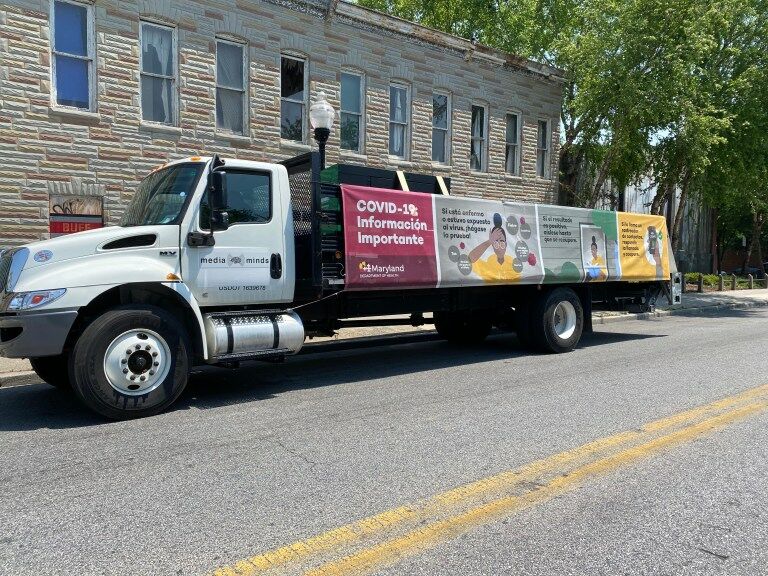This article was republished with permission from WTOP’s news partners at Maryland Matters. Sign up for Maryland Matters’ free email subscription today.

This content was republished with permission from WTOP’s news partners at Maryland Matters. Sign up for Maryland Matters’ free email subscription today.
“Our message today is that the vaccines are the best shot that we have at ending the pandemic,” said Baltimore City NAACP President the Rev. Kobi Little at a news conference Wednesday afternoon.
In partnership with the Baltimore City Chapter of the NAACP, the Maryland Department of Health is driving a truck covered in informational banners with loud speakers that blare messages in English and Spanish to encourage residents to get vaccinated. The trucks will roam through communities in the 21223, 21213, 21205, 21216 and 21217 zip codes through Sunday.
Representatives from the Department of Health and NAACP will hand out masks and information sheets in coordination with the truck’s journey.
According to the Baltimore City Health Department’s vaccine dashboard, all of the zip codes targeted by this campaign have some of the lowest vaccination rates in the city.
This is a revamp of the truck’s original fall campaign, which urged residents in Baltimore’s 21224 zip code to get tested and participate in a contact tracing program.
“We know that it’s effective,” said Dr. Mark Martin, deputy director of the Maryland Department of Health’s Office of Minority Health and Health Disparities, noting that 3,000 information sheets and approximately 1,000 masks were handed out during the truck’s fall run.
Martin credited the booming sound from the truck’s speakers for reaching people both on the street and inside their homes. And he said he “did hear” that some people went out to get tested because of the messages broadcast in English and Spanish.
“…It’s one of these targeted micro-strategic ways of trying to reach people right where they are,” Martin said. “That’s what we’re about, and so we’re just really glad that it’s back out.”
Martin said that experts and community leaders have noticed a hesitancy in communities of color to get vaccinated against COVID-19.
“Our messaging has been to push the vaccination messaging, utilize trusted voices in the community — of Black and Brown clinicians — to speak to the efficacy of the vaccines and to build confidence,” he said.
A big part of that effort, Martin said, is the Vaccine Equity Task Force, led by Maryland National Guard Brig. Gen. Janeen Birckhead. The task force works with local health departments and faith- and community-based organizations to offer pop-up vaccination clinics in what Martin called “hard-to-reach” communities.
“We can’t be everywhere at every time, but we have great community partners that we rely on who stand shoulder-to-shoulder with us as we continue to fight this pandemic,” he said.
Little said that vaccine inequity is rampant in Baltimore.
According to the U.S. Census Bureau, the city’s population is 63% Black and 32% white.
As of May 25, just 39% of the city’s fully vaccinated population was Black, while 43% was white, according to the Baltimore City Health Department’s vaccine dashboard.
“Instead of having a two to one ratio … we have essentially almost a one-to-one ratio,” Little said at the Wednesday news conference. “In order to get equity, that means that we need the state, the city and healthcare institutions to lean in and to help us reach the people in our communities.”
“But it also means that in the Black community and in the Brown community, we have to have the kitchen table conversation, and the neighborhood stoop conversation, and the church Zoom conversation with our friends and our families and our neighbors to say: ‘The vaccine is the best shot that we have at ending this pandemic. If we don’t take action, then we will continue to be vulnerable for infection,’” Little continued.
Community organizations have been at the forefront of this fight in the city.
Tiffany Majors, president of the Greater Baltimore Urban League, appeared at the news conference Wednesday to promote a free vaccine clinic her organization is holding on June 12.
People who receive vaccines that day will get their second doses on July 10.
Ashiah Parker, executive director of the No Boundaries Coalition, helped get 31 people vaccinated last Saturday at a celebration of life event held to honor community members lost to COVID-19 in the past year.
“We were very excited about that,” she said, “but we know it’s more than 31 [people who need access to the vaccine].”
Parker said that “greater effort” and “easily available funding” is necessary to “get the word out and to actually get vaccinated.”
“I just want to put it out there to the state and to the local government that, as the community is doing this work to make sure that we are all safe, it does take resources and true equity which means scrambling to make sure that vaccine is available,” she said.







